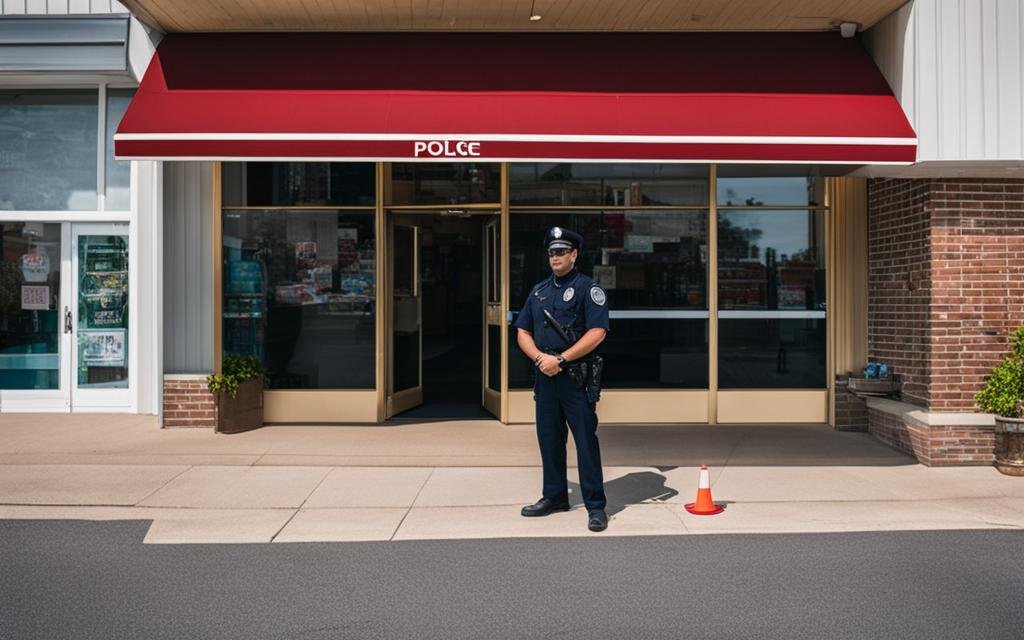If you’re in Ohio, you may have noticed that some stores are closed or have limited hours on Sundays. This is due to Ohio’s unique Sunday Shopping Law, also known as Ohio Blue Laws. These laws aim to restrict certain commercial activities on Sundays, which is considered a day of rest and religious observance for many people.
But what exactly is illegal to buy on Sundays in Ohio? Understanding the restrictions and limitations on Sunday shopping can help you plan your errands and avoid any legal issues. In this section, we will explore the specific laws and regulations surrounding Sunday purchases in Ohio. Find out what items are prohibited for sale on Sundays and understand the legal limitations on Sunday shopping in the state.
Ohio’s Sunday Shopping Law has been in place since the early 19th century, and it imposes certain limitations on commerce, entertainment, and other activities on Sundays. The purpose of the law is to preserve the sanctity of the day and give people a chance to rest, worship, and spend time with their families.
However, these restrictions can also cause inconvenience and frustration for consumers and businesses. Some argue that the law is outdated and unnecessary in a modern society, while others believe it should be strengthened and enforced more strictly.
In the following sections, we will examine the specific details of Ohio’s Sunday Shopping Law, including the prohibited purchases, exceptions, enforcement, and public opinion surrounding this controversial legislation.
Understanding Ohio’s Sunday Shopping Law
If you live in Ohio or plan to visit the state, it’s important to understand the regulations surrounding Sunday shopping. Ohio is one of a few states that has a “blue law,” which limits certain types of commercial activity on Sundays. Specifically, the Ohio Sunday Shopping Law prohibits the sale of certain items on Sundays or restricts the hours during which businesses can operate.
The history of blue laws dates back to colonial times and originally had religious roots. However, today, blue laws are generally viewed as a means of regulating commerce and giving workers a day of rest. In the case of Ohio, the Sunday Shopping Law is designed to promote family time and community activities on Sundays and to provide employees in retail and service industries with a break from work.
Under the Sunday Shopping Law, businesses are generally not allowed to sell cars, motorcycles, boats, and other motor vehicles on Sundays. In addition, sales of clothing, furniture, household goods, and appliances are prohibited before 11:00 a.m. on Sundays. However, grocery stores, drug stores, gas stations, and convenience stores are exempt from these restrictions and can operate as usual on Sundays.
It’s worth noting that the Ohio Sunday Shopping Law does not apply to online purchases. You can still shop online and have items delivered on Sundays, even if they are prohibited from being sold in physical stores on that day. Additionally, businesses can apply for permits to sell items that are normally prohibited on Sundays if they meet certain criteria.
Understanding the Ohio Sunday Shopping Law is important if you want to avoid any legal issues or fines. By knowing the restrictions and exceptions, you can plan your shopping and leisure activities accordingly and enjoy your Sundays in Ohio.
Prohibited Purchases on Sundays in Ohio
Ohio’s Sunday Shopping Law outlines a list of items and businesses that are restricted on Sundays. The law was created to allow employees to take a day off and to give families the opportunity to spend time together.
The following products are prohibited from being sold on Sundays in Ohio:
- Automobiles and other motor vehicles
- Cigarettes and other tobacco products
- Liquor, beer, and wine
- Firearms and ammunition
- Certain electronic items, such as computers and video game consoles
Additionally, certain types of businesses are restricted from operating on Sundays. These include:
- Department stores larger than 7,000 square feet
- Grocery stores larger than 5,000 square feet that sell general merchandise
- Furniture stores
- Hardware stores
- Building material suppliers
It is important to note that some of these restrictions may be waived for specific circumstances or businesses that qualify for exceptions. It is also possible for local governments to enact their own restrictions on Sunday sales beyond those mandated by the state law.

Violating Ohio’s Sunday Shopping Law can result in fines and penalties for both businesses and individuals. It is crucial to understand the legal limitations on Sunday shopping in Ohio before making any purchases on this day of the week.
Exceptions to Ohio’s Sunday Shopping Law
While Ohio’s Sunday Shopping Law imposes certain restrictions, there are exceptions to these rules. If you are planning to operate a business on Sundays, it is important to understand when and how you can be exempt from the limitations.
- Religious observances: Certain religious organizations can sell items related to their beliefs on Sundays, even if those items are otherwise prohibited.
- Pharmacy sales: Pharmacies are permitted to sell prescription drugs and medical supplies on Sundays. However, they cannot sell non-prescription items like toiletries or cosmetics.
- Restaurants and bars: Food and drink establishments are allowed to operate on Sundays, but alcohol sales are restricted to certain hours.
- Gas stations and convenience stores: Gas stations can sell fuel and other automotive products on Sundays. Convenience stores can also sell items like snacks and beverages, but not alcohol or tobacco products.
It is important to note that these exceptions are limited and specific. If you are unsure whether your business qualifies for an exemption, it is best to consult with legal counsel or state authorities before making any sales.
Enforcing Ohio’s Sunday Shopping Law
Enforcement of Ohio’s Sunday Shopping Law is primarily the responsibility of local law enforcement agencies, such as the police department or sheriff’s office. These agencies monitor compliance with the law and investigate potential violations.
If a business is found to be selling prohibited items on Sundays, they may face penalties, including fines and other legal consequences. Individuals who purchase prohibited items on Sundays may also face penalties under the law.
The penalties for violating Ohio’s Blue Laws vary depending on the offense. In some cases, individuals or businesses may receive a warning or a small fine for a first-time violation. However, repeated violations or more serious offenses may result in larger fines or even criminal charges.
It is important to note that enforcement of the Sunday Shopping Law can be inconsistent between different jurisdictions in Ohio. While some areas may actively enforce the law, others may not place as much emphasis on its enforcement.

If you are a business owner in Ohio, it is important to understand the restrictions and exceptions outlined in Ohio’s Sunday Shopping Law and ensure compliance with the regulations. If you are an individual consumer, be aware of the items that are prohibited from purchase on Sundays to avoid potential penalties.
Public Opinion and Debate on Ohio’s Sunday Shopping Law
The Ohio Sunday Shopping Law has been a topic of debate since its inception. Some argue that the law is outdated and unnecessary in today’s society, while others believe that it serves an important purpose in preserving a day of rest and reflection.
Those in favor of the law often cite religious or cultural reasons for supporting it. Many individuals and organizations believe that Sunday should be a day for quiet reflection and time with family, and that commercial activities should be limited. They argue that the law encourages individuals to prioritize their personal lives over materialistic pursuits and helps to maintain a healthy work-life balance.
Others argue that the law is too restrictive and harms businesses and consumers. They point to the lost revenue and economic opportunities that result from limiting commercial activity on Sundays. Additionally, some believe that the law interferes with individual freedom and the ability to make personal choices about how to spend their time and money.
The debate over Ohio’s Sunday Shopping Law is likely to continue as both supporters and opponents of the law hold strong opinions. However, by understanding the various perspectives and arguments surrounding the law, individuals can make informed decisions about their own beliefs and actions.
Conclusion
Ohio’s Sunday Shopping Law imposes unique restrictions on commercial activities on Sundays, commonly known as Ohio Blue Laws. As a consumer or business in Ohio, it is important to understand the limitations and exceptions to these regulations.
Prohibited purchases on Sundays in Ohio include various items such as liquor, cars, and appliances. However, there are exceptions to the law, including grocery stores, gas stations, and drug stores. Businesses that violate the law may face penalties, including fines and legal action.
The ongoing debate surrounding Ohio’s Sunday Shopping Law centers on the balance between religious observance and modern commerce. While some argue that the restrictions are outdated and unnecessary, others view Sunday as a day of rest that should be preserved.
Regardless of your personal stance on the issue, it is essential to understand Ohio’s Sunday Shopping Law and its implications. By staying informed and aware, you can make informed choices and navigate the regulations effectively.
So whether you’re a consumer planning your weekend shopping or a business owner looking to comply with the law, remember to keep Ohio’s Sunday Shopping Law in mind and stay up to date with any changes or updates.
FAQ
What items are prohibited for sale on Sundays in Ohio?
The specific items that are prohibited for sale on Sundays in Ohio can vary, but generally include automobiles, motorboats, and certain types of clothing such as fur garments. Additional restrictions may apply to specific businesses or industries. It is recommended to consult the Ohio Revised Code or seek legal advice for a comprehensive understanding of the prohibited items.
What is Ohio’s Sunday Shopping Law?
Ohio’s Sunday Shopping Law, also known as the Ohio Blue Laws, is a set of regulations that impose restrictions on commercial activities on Sundays. The law aims to preserve a day of rest and observance. It establishes limitations on the sale of certain products and the operation of certain businesses on Sundays in the state of Ohio.
What products are not allowed for purchase on Sundays in Ohio?
The products that are typically not allowed for purchase on Sundays in Ohio include automobiles, motorboats, certain types of clothing, and other items specified by the Ohio Revised Code. It is important to note that certain businesses or industries may have their own additional restrictions. To ensure compliance, it is best to consult the specific laws and regulations or seek professional advice.
Are there any exceptions to Ohio’s Sunday Shopping Law?
Yes, there are exceptions to Ohio’s Sunday Shopping Law. Certain circumstances or businesses may be exempted from the restrictions, allowing them to operate and sell prohibited items on Sundays. It is essential to understand the specific conditions and criteria for these exceptions. Consulting the Ohio Revised Code or legal professionals can provide more information on the exceptions within the law.
What are the penalties for violating Ohio’s Sunday Shopping Law?
The penalties for violating Ohio’s Sunday Shopping Law can vary depending on the nature and severity of the violation. Businesses or individuals found in non-compliance with the law may face fines, legal action, or other consequences. It is crucial to understand and adhere to the regulations in order to avoid potential penalties. Seeking legal guidance can provide a more comprehensive understanding of the potential consequences.
What is the public opinion on Ohio’s Sunday Shopping Law?
The Sunday Shopping Law in Ohio has generated public discussion and debate. Various perspectives exist, with some advocating for the preservation of a day of rest and observance, while others argue for more flexibility in commercial activities. The law’s relevance and impact on individuals, businesses, and society as a whole are topics of ongoing conversation. Engaging in the public dialogue can provide insights into the diverse opinions surrounding this law.

